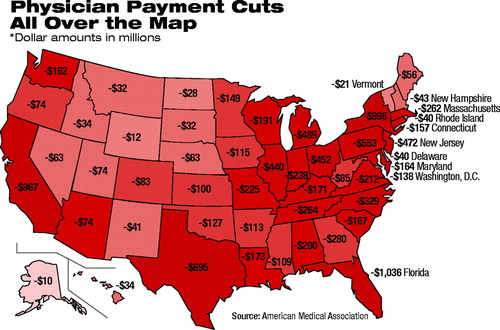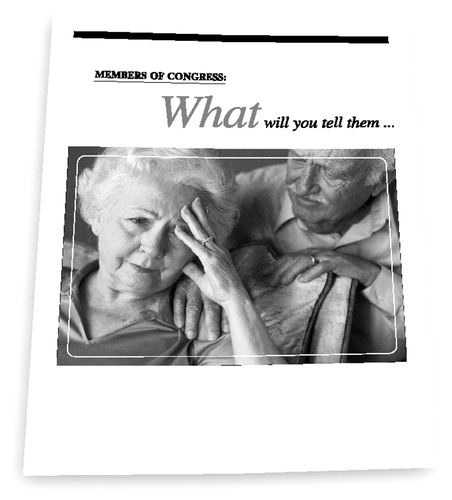Payment Cuts Cause M.D.s to See Fewer Medicare Patients
The AMA released data at a press conference on October 15 indicating that without new legislation, Medicare payments will be cut by $11 billion over the next three years. (See map for cuts by states.)
 In a written statement, AMA President-elect Donald J. Palmisano, M.D., said, “If Congress doesn’t act, Medicare payments in 2005 will be back below the 1991 level. These Medicare cuts are coming at a time when physicians’ practice expenses, particularly medical liability insurance costs, are skyrocketing.”
In a written statement, AMA President-elect Donald J. Palmisano, M.D., said, “If Congress doesn’t act, Medicare payments in 2005 will be back below the 1991 level. These Medicare cuts are coming at a time when physicians’ practice expenses, particularly medical liability insurance costs, are skyrocketing.”
According to the AMA, physicians will receive a 4.4 percent cut in Medicare reimbursement on January 1, 2003, with similar cuts projected for the next two years.
Several surveys document a decline in access to physicians for Medicare patients.
• The AMA conducted an online survey from February through April that found that 24 percent of physicians who responded had limited or intended to limit the number of Medicare patients in their practice. Forty-two percent said they would not sign or continue Medicare participation if there were significant payment cuts next year.
• In a July issue brief, the Medicare Rights Center (MRC) reported that 17 of 30 states surveyed said that Medicare beneficiaries were having trouble finding a doctor. Six of 15 states said the problem worsened after the cuts.
• The MRC issue brief also reported that four states said that since last January there had been an increase in calls from people who could not find specialists taking new Medicare patients. Psychiatrists, oral surgeons, and dermatologists were cited most frequently as being in short supply.
• In a September issue brief, the Center for Studying Health System Change (HSC) reported that access was declining even before the cut. HSC Director Paul Ginsburg, Ph.D., said, “[A]dditional Medicare cuts of the magnitude expected over the next few years are likely to increase beneficiaries’ access problems.”
• In a September 12 presentation to the Medicare Payment Advisory Commission, Project Hope reported preliminary survey results that found that the percentage of physicians accepting all new Medicare patients declined from 76.4 percent in 1999 to 69.2 percent in 2002.
Edward Gordon, M.D., chair of APA’s Medicare Advisory Corresponding Committee, told Psychiatric News, “The effect of any reduction in payment is particularly harsh for psychiatric patients because psychiatrists receive reimbursement only at the rate of 50 percent.”
He added, “Patients who are poor or in nursing homes will be hit the hardest by any cuts that further erode access. Already there are states in which only one or no psychiatrist treats Medicare patients in nursing homes. Psychiatrists cannot absorb the escalating costs of treatment coupled with a discriminatory copayment that is decreasing in value.”
The Kaiser Daily Health Report at www.kaisernetwork.org reported on October 15 the opinion of Congressional Quarterly reporter Samuel Goldreich that no bill changing the Medicare payment formula would pass both chambers before the congressional elections in November.
 In June the House of Representatives passed a bill (HR 4954) that would allow physicians an increase averaging 2 percent each year over the next three years. The bill also includes a prescription drug benefit.
In June the House of Representatives passed a bill (HR 4954) that would allow physicians an increase averaging 2 percent each year over the next three years. The bill also includes a prescription drug benefit.
In the Senate, the physician payment section of HR 4954 is part of a $43 billion legislative package sponsored by Sens. Max Baucus (D-Mont.) and Charles Grassley (R-Iowa). Baucus and Grassley are the chair and ranking member, respectively, of the Senate Finance Committee.
Their bill, which has not been introduced formally, includes additional funding for Medicaid and the State Children’s Insurance Program (SCHIP) and increases for other medical services and institutions. It does not have a prescription drug benefit.
The October 17 Kaiser Daily Health Report said that Baucus had tried for the second time to send the bill directly to the Senate floor for consideration.
That action requires unanimous consent. Senate Minority Whip Don Nickles (R-Okla.) objected to the action, requesting that the bill be sent to the Senate Finance Committee for markup. Democrats did not agree to send the bill to the committee, arguing that sufficient member-to-member and staff meetings had occurred to bring the bill directly to the floor.
In related news, on October 1 states lost $1.2 billion that had been appropriated by Congress for SCHIP (Psychiatric News, October 18). New York lost $397 million, about one-third of the total it had gotten. Indiana and North Carolina each lost $100 million.
States have three years to use the federal money received for a given year. At the end of that period, the federal government can redistribute any unused funds to states that have spent their allotments. If, however, the reallocated funds are not spent within an additional three years, they revert to the U.S. Treasury.
According to the October 13 New York Times, the Bush administration estimates that states will lose $1.6 billion next year if Congress takes no action.
APA joined 70 other advocacy groups in a letter of support for legislation (S 2860) introduced by Sen. John D. Rockefeller III (D-W.V.) that would have extended the availability of the expiring SCHIP funds and targeted them to states where they are most needed (Psychiatric News, October 18).
The AMA’s Web site, www.ama-assn.org, offers frequent updates about physician payment legislation and issues. The text of the bills cited above can be accessed on the Web at http://thomas.loc.gov by searching on the bill number. ▪



